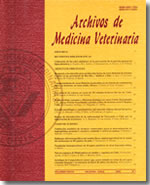Comparative pharmacokinetics of a single dose of ampicillin following intravenous, intramuscular and subcutaneous administration to llamas
Main Article Content
Abstract
Six healthy, adult llamas (Lama glama) received a single intravenous (i.v.), intramuscular (i.m.) and subcutaneous (s.c.) administration of ampicillin at a dosage of 20.0 mg/kg body weight. Venous blood samples were collected, and ampicillin plasma concentrations were determined by microbiological assay. Kinetic calculations were done using noncompartmental analysis. The period of time that plasma concentrations spent above the minimum inhibitory concentration (T > MIC) was graphically determined. Following the i.v. administration, mean pharmacokinetic parameters (± SD) were as follows: terminal elimination half-life (t½λ) 0.52 ± 0.1 h, total body clearance (Clt) 10.3 ± 1.3 ml/kg·min, volume of distribution at steady state (Vss) 0.35 ± 0.07 l/kg. Following the i.m. and the s.c. administration, significant differences were determined for peak concentrations (34.1± 6.2 and 18.6 ± 6.3 μg/ml, respectively), time to peak concentrations (0.26 ± 0.08 and 0.6 ± 0.2 h, respectively); t½λ(0.83 ± 0.17 and 1.66 ± 0.6 h, respectively); mean residence time (1.3 ± 0.3 and 2.7 ± 1.0 h, respectively), and mean absorption time (0.72 ± 0.2 and 2.1 ± 0.9 h, respectively). T > MIC values suggest that different ampicillin s.c. and i.m. dosing should be used in llamas, as s.c. injection provides therapeutically effective plasma concentrations for a longer duration.

